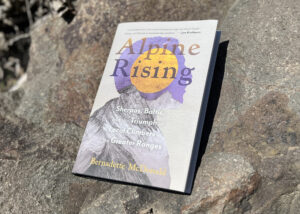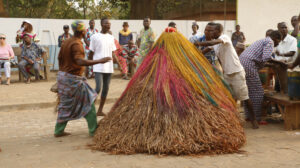American writer Harlan Coben described adolescence as a war in which “no one gets out unscathed.” As the age of innocence ends and adulthood approaches, cultures from around the world choose to test their young adults in some, uh, unique ways.
We rounded up some of the most extreme coming-of-age rituals from across the planet.
Walkabout
The term “going walkabout” refers to wandering aimlessly. However, in Australian Aboriginal culture, a walkabout is much more than that. It is a sacred ceremony in which a boy becomes a man.
As a test of his bravery, boys between the ages of 10 and 16 must venture into the scorching Outback for up to six months. Without modern navigation instruments or weaponry, the adolescents must hunt for food, build shelters, and then find their way back home after this temporary exile.

Aboriginal Australian on walkabout. Photo: Zlata Praha
Before he ventures out into the wild, the boy receives counsel from his elders. He learns hunting methods, sacred songs which highlight geographical features, and the importance of ancestral lands.
The rite of passage has both physical and spiritual bearing. It tests whether the boy is ready for adulthood and of accepting the responsibilities that come with that role.
Fulani Whip Match
The Fulani tribe are scattered across the Sahel, West, and Central Africa, and are likely the largest nomadic pastoral community in the world. Young men from the tribe go through an intense transition to adulthood.
Boys approaching the age of 12 or 13 must undergo a painful ceremony to prove their capabilities. They must duel each other for their status as a man. Each boy must find the perfect stick, sharpen it into a whip, and use it against their opponent. The goal is to inflict pain, to make the other boy bleed, to withstand pain, and most of all to win the crowd’s favor. The crowd’s support ultimately determines who becomes a man.
During the match, the boys only need to deal three blows while trying hard not to show their pain. Boys can carry scars from a match for the rest of their lives. However, the loser does not return home humiliated and downtrodden. Spectators support the loser by showering him with gold coins and powder.
Land Diving
For some, adulthood is a leap of faith. The people of Pentecost Island in Vanuatu, in the South Pacific east of Australia, take this literally. Boys as young as nine climb a 20m to 30m tower made of tree branches, vines, poles, and platforms. They tie lianas to their ankles and bungee jump from the top to earn their place among the tribe’s warriors.

Land diving on Pentecost Island. Photo: Paul Stein/Wikipedia Commons
According to legend, the practice began when a woman jumped from a banyan tree to escape her abusive husband. She tied lianas to her ankles and jumped, but when her husband tried to follow, the fall killed him. Men of the village chose to mimic the legend as the ultimate test of masculinity. The ceremony also coincides with the annual yam harvest, with very high jumps said to ensure a bountiful year.
To prepare for the jump, men seclude themselves from women and sleep at the base of the tower. The morning before the jump, the boy must take a ritualistic bath, cover themselves in coconut oil and body paint, and wear boar tusks.
Survival depends on the elasticity of the lianas and the positioning of the dive. The ceremony takes place between April and June because the wet season ensures the elasticity of the lianas.
Jumpers should tuck their heads in as they dive, allowing their shoulders to brush the soft soil below. However, jumpers sometimes break their necks or shoulder blades. Some have died.
Recently, the ceremony has become a tourist attraction, although with restrictions to protect its authenticity.
Bullet Ant Glove
Paraponera clavata, commonly known as the bullet ant, is a dangerous species with a pain index of 4.0+ on the Schmidt pain scale. Those unfortunate enough to cross its path have described their encounters with the insect as similar to getting shot.
The Sateré-Mawé tribe of the Brazilian Amazon uses these 18-30mm long, red-black ants to initiate their young boys into adulthood.
Boys collect the ants by sedating them, and a craftsman places them inside a woven glove. To wake the ants and encourage them to sting, the tribe blows smoke into the glove. After this, a boy covers his hands in charcoal and places them inside the glove for 10 minutes. He must do this 20 times while performing a ritual dance. This process is repeated for a few months before the boy can be called a man.
The pain can result in temporary paralysis, throbbing pain lasting for days, and hallucinations.
Cow jumping

Cow jumping in Ethiopia. Photo: Rod Waddington
Boys of the Hamar Tribe in Ethiopia’s Ono Valley must go through this peculiar, centuries-old ceremony to prove they are worthy of starting a family. Around October, men determine whether their sons are up for the task or not. If ready, boys shave their heads, cleanse their bodies with sand, cover themselves in excrement, and adorn their bodies with pieces of tree bark.
The first to attempt the cow jump are firstborn boys. They must run naked along the backs of 10 excrement-covered, castrated bulls five times. Younger brothers can only do the ritual after their eldest brother completes it.
If successful, the boy is allowed to marry. Fathers then pick the woman they want their sons to marry. Those that fail have to wait a year to try again.






